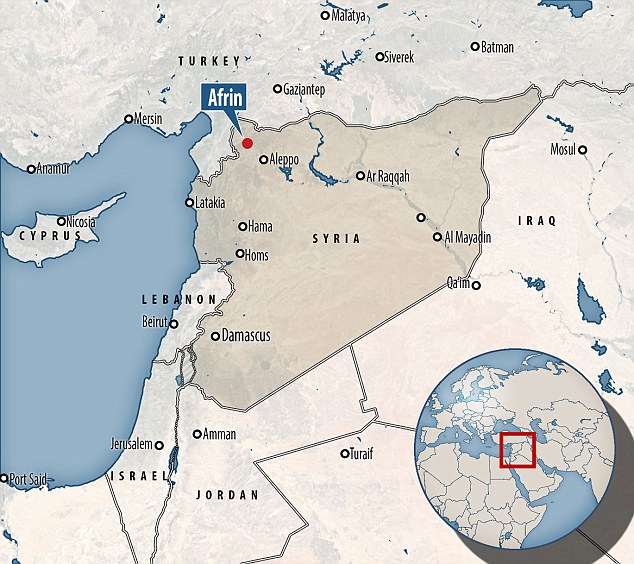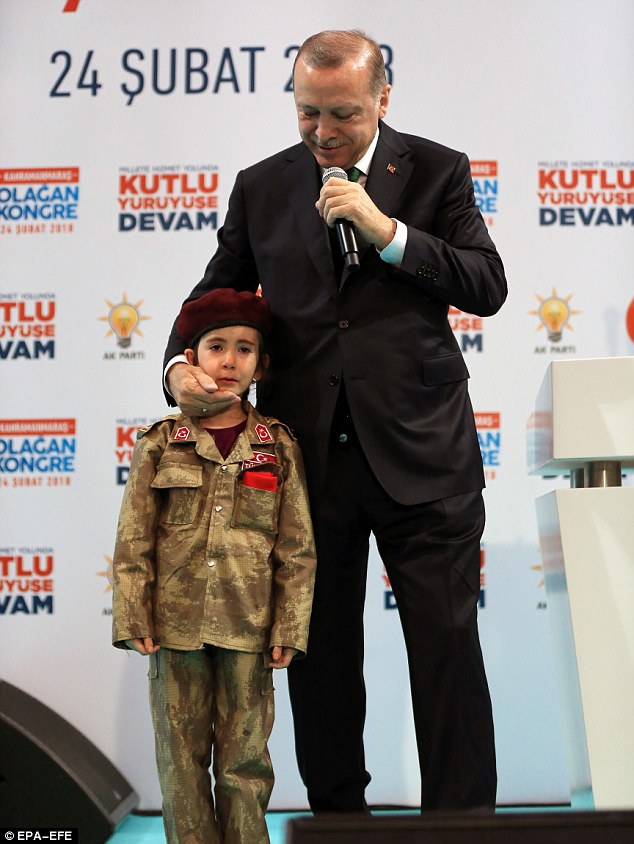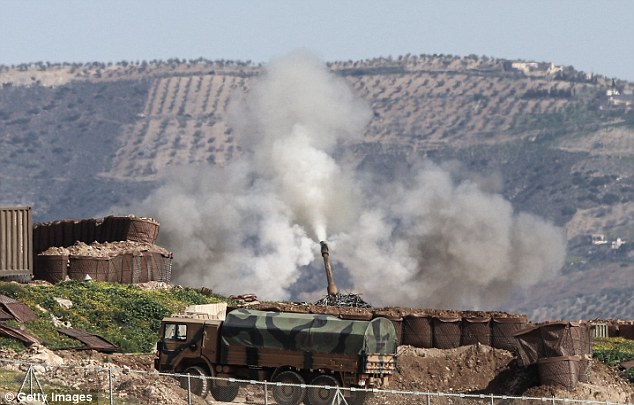President Recep Tayyip Erdogan’s call for the Turkish army reserves to be ready for a possible mobilization has generated a lasting controversy.
“Those conscripts who just completed their compulsory service and has ‘active duty order’ with them must be ready any moment. They would be called for duty,” the president said during a speech at the weekend at his party meeting on eastern province of Kahramanmaras.
The remarks came when he informed his ruling Justice and Development Party (AKP) supporters about the latest state of Turkey’s ongoing military offensive against the Kurdish enclave of Afrin. The president’s statement was initially interpreted as a new government preparation to declare a mobilization of the army reserves.
During the same speech, President needed to clarify his statement and said there is no need for such a call at the moment. It sparked a rush on behalf of the citizens and young soldiers who served in the military to learn whether they have such a mobilization order.
It caused a crash on the government website when millions of people tried to learn through their personal pages if there is an official call issued for them.
But Deputy Prime Minister Bekir Bozdag tried to downplay swirling rumors about a new government policy.
“The president himself said at the same speech. Right now, there is no need for the reserves who have active mobilization order to be sent to the region [Afrin],” he said.
The issue came to the fore as the Turkish forces and its rebel allies have seemingly faced a stiff resistance by the Kurdish militants during the offensive against Kurdish enclave of Afrin.
“I’d like to push back on the characterization of Erdogan’s remarks a bit. Erdogan actually emphasized that Turkey will “decisively” continue its operation against the Syrian Kurdish People’s Protection Units (YPG) in Afrin in a speech on Saturday and stated Turkey is deploying an “educated cadre” to take part in the Afrin mission,” Elizabeth Teoman, Turkey Research Fellow at Institute for the Study of War, told Globe Post Turkey.
“However, I would not characterize the current deployments as “mass mobilization” per say. Turkey has begun to deploy up to 1,200 Gendarmerie Special Operations (JOH) forces) to conduct urban operations against the Syrian Kurdish YPG in Afrin,” she added.
She noted that the definition of this force as “mass mobilization” is where Bozdag may be splitting hairs.

Turkey launched the offensive late last month in a bid to uproot YPG from Afrin. Ankara sees the YPG’s military presence across its southern border as a threat due to the militia’s ties to Kurdistan Workers’ Party (PKK), which has locked in a decades-old tussle with the Turkish state to carve up a self-autonomous zone in southeastern Turkey.
According to Ms. Teoman, the recent deployment fits within Erdogan’s current campaign in Afrin to establish a “buffer zone” along the Syrian-Turkish border and these forces will likely focus on seizing YPG-held Rajo and Jinderes Town in the coming days. “Ultimately, armed conflict between Turkey and the Syrian Kurdish YPG will not abate in the near future and will continue to be a flashpoint for other actors, including the Assad regime, to intervene.”
The mobilization order is imposed during times of war and enables the government to call soldiers who completed their military service back for the duty, to send them to the battlefront. The last time Turkey declared mass mobilization was during the Second World War. However, it employed partial mobilization during First Gulf War in 1991 when the Turkish military amassed nearly 100,000 forces near the Iraqi border. It also kept battle-ready units against the Soviet Union during the Cold War and moved troops to the Aegean region in case of a war with Greece during the 1974 Cyprus intervention.
Turkey has 378,000 army reserves which called into action anytime the Turkish General Staff deems necessary.
Erdogan and a Little Girl
During the same speech, President Erdogan told a small girl that if she is martyred, she will be honored by being wrapped in a Turkish flag. The scene captured national attention and has generated heated discussions over the recent government rhetoric centered on marketing martyrdom and worshipping of death.

“Her Turkish flag is in her pocket,” the president said. “If she becomes a martyr, God willing, she will be wrapped with it. She is ready for everything, aren’t you?” the New York Times quoted Mr. Erdogan as saying.
“When I saw his comments on the contingency of mass/reserve mobilization and also the footage with the little girl in fatigues and special forces beret I felt a democratic “red line” was passed, demarcating that from now on there is no limit to what he would do and say for the purpose of domestic mobilization and the function of polarization,” Michael Sahlin, former Swedish Ambassador to Turkey, told Globe Post Turkey.
Mr. Sahlin believes that the Turkish president’s primary “focus, apparently, is now fully on winning the forthcoming election. My hunch, he noted, is these elections will be announced to be held on July 15 this year, perhaps all three together, including the municipal elections which were supposed to be held separately and before the joint presidential/parliamentary, there being several strong indicators pointing in that direction.
“Erdogan is, however, facing a dilemma here. Prolonging the state of emergency, perhaps indefinitely, is bad for the economy and bad for Turkey´s image in the West,” he added.
This leaves the regime with the option of whipping up and seeking to maintain an atmosphere of fear and nationalistic frenzy (which cannot be upheld indefinitely, hence early elections, with all the risks this would imply), the ambassador who is now a distinguished research fellow at Stockholm International Peace Research Institute (SIPRI) said.
For him, the Turkish leader is conducting a near-impossible balancing act between two horns of a dilemma: keep and if possible increase the nationalistic heat (by warmongering, U.S./E.U. bashing and conspiracy theorizing), but seek at the same time to project an image of normalcy (in view of the needs of the Western-dependent economy) and foreign respect for Turkey´s greatness.
“This I believe is the main overall context,” he said, explicating the main contours of President Erdogan’s Afrin dilemma and his recent remarks.
Turkey’s thrust into northern Syria has become a source of division and ensuing discord between Ankara and its Western allies.
The U.S. alliance with Syrian Kurds remains to be a stumbling block for a working partnership between the two NATO allies in northern Syria. Ankara threatened to expand the Afrin offensive toward Kurdish-held Manbij, home to the U.S. special forces.
“Mr. Erdogan has been building a nationalist wave for some time, a process that has been facilitated by the deterioration of U.S.-Turkish relations over Syria,” said Svante Cornell, Publisher of Turkey Analyst and Director of Central Asia-Caucasus Institute.
He noted that the military operations in Syria are, on the one hand, endorsed by the Turkish state institutions and the opposition. But Mr. Erdogan also seems to be seeking to take political advantage of it, as former Chief of Staff Ilker Basbug complained recently.
Mr. Cornell, in remarks to Globe Post Turkey, explained Mr. Erdogan’s policy choices and public remarks from the angle of domestic politics.
“Mr. Erdogan’s party is in disarray. As previously, when he merged smaller parties like those led by Suleyman Soylu and Numan Kurtulus with the AKP, he is working to consolidate his coalition of support by amalgamating the MHP into the AKP for upcoming elections, something made possible mainly by the nationalist mood in the country,” he said.
This, in turn, he emphasized, could make it impossible for the similarly nationalist but opposition IYI (Good) Party to challenge Mr. Erdogan.
Against that backdrop, he sees the talk of mobilization of reserves as mainly rhetoric for political purposes.
“That said, I think it is clear the Turkish military operation in Syria will continue, as there appears to b a consensus that a security zone on the Syrian side of the border should be established,” he said in conclusion.




Comments are closed.